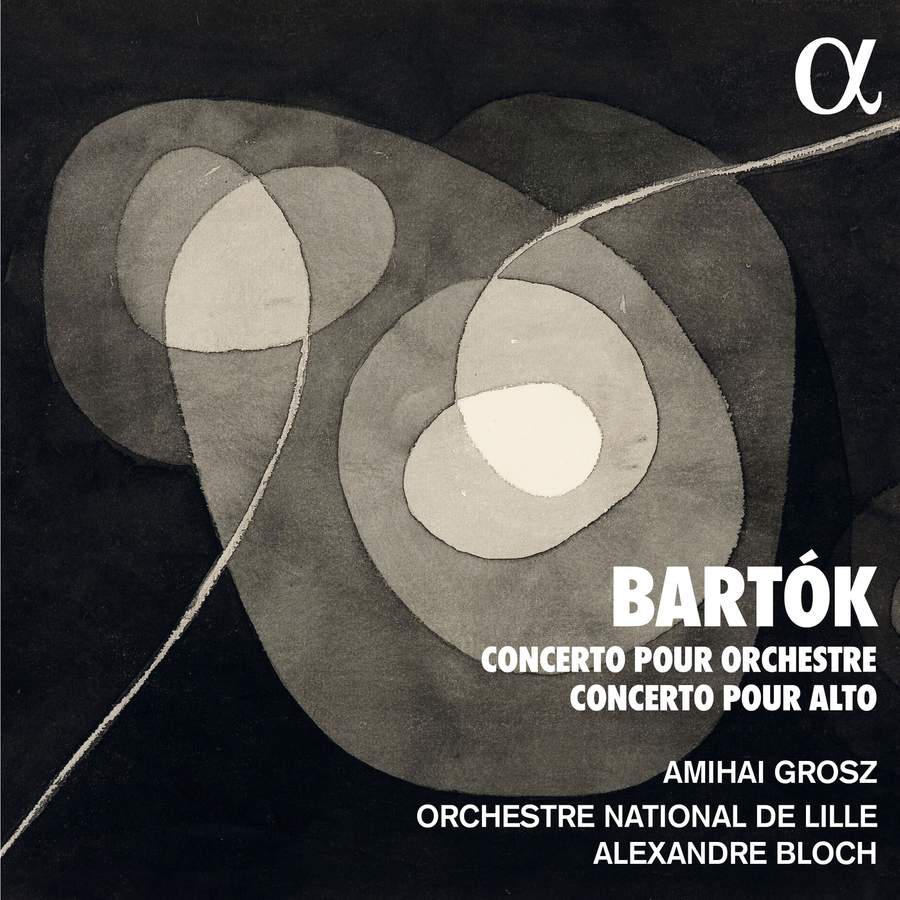BARTÓK Concerto for Orchestra; Viola Concerto (Amihai Grosz)
View record and artist detailsRecord and Artist Details
Genre:
Orchestral
Label: Alpha
Magazine Review Date: AW23
Media Format: CD or Download
Media Runtime: 62
Mastering:
DDD
Catalogue Number: ALPHA1013

Tracks:
| Composition | Artist Credit |
|---|---|
| Concerto for Orchestra |
Béla Bartók, Composer
Alexandre Bloch, Conductor Lille National Orchestra |
| Concerto for Viola and Orchestra |
Béla Bartók, Composer
Alexandre Bloch, Conductor Amihai Grosz, Viola Lille National Orchestra |
Author: David Gutman
Having made waves with one of the best Mahler Sevenths of recent times (Alpha, 11/20), this latest Bartók pairing confirms the potency of Alexandre Bloch and his Lille orchestra away from the French repertoire in which they might be expected to excel. Competition in the Concerto for Orchestra is impossibly fierce but as far as I am aware the present coupling is unique. It makes sense, too, given the Viola Concerto’s fleeting glances at the earlier score. Like most of his peers, Amihai Grosz holds fast to Tibor Serly’s realisation of the unnumbered manuscript pages left by the composer. Not everything succeeds. We know Bartók intended to begin with a dialogue between viola and timpani and the substituted pizzicato bass never sounds well. Compare and contrast Kim Kashkashian with Peter Eötvös (ECM, 7/00): you’ll find them combining both colours, just one of their many tactful adjustments.
At first I wondered whether Alpha’s recording team were doing quite enough with what little flesh exists on the bones of the conventional Serly score. Later the balance seems to improve. Warmer (and tauter) in the first movement, Grosz is tear-jerking in the Adagio religioso, extrovert in the finale. If you don’t know the name you will know the playing. A founder member of the Jerusalem Quartet, he remains today one of the Berlin Philharmonic’s principal viola players, solo career notwithstanding. Perhaps Yehudi Menuhin’s collaboration with Antal Dorati (EMI/Warner, 9/67) yields an even more heartfelt, ‘human’ account of the solo part but with all due respect to those great Bartókians, not everything has changed for the worse in the intervening years. Grosz has a fabulously rich-sounding Gasparo da Salò instrument, an altogether more secure technique and intonation to die for.
In the Concerto for Orchestra no attempt is made to ape the big sonority typical of recordings by émigré Hungarians on American turf. Doubtless Bloch has in mind the airier freshness on offer in Budapest. The first movement, pensive in mood, is not driven too hard. The second, predictably dapper, allows secondary voices unaccustomed prominence in complementing the duetting wind couples. You may find the articulation of rhythm in the ‘Elegia’ a little self-conscious, timbres too bright to do justice to its brooding atmosphere. Then again, it would be difficult to carp at the fine detailing, broad humour and, finally, aching nostalgia of the Intermezzo. The finale is nothing if not propulsive. The generously illustrated annotations are a plus and the sound faithful. Recommended.
Discover the world's largest classical music catalogue with Presto Music.

Gramophone Digital Club
- Digital Edition
- Digital Archive
- Reviews Database
- Full website access
From £8.75 / month
Subscribe
Gramophone Full Club
- Print Edition
- Digital Edition
- Digital Archive
- Reviews Database
- Full website access
From £11.00 / month
Subscribe
If you are a library, university or other organisation that would be interested in an institutional subscription to Gramophone please click here for further information.




